Products are chosen independently by our editors. Purchases made through our links may earn us a commission.
Pet ownership can be a huge benefit to anyone, but this is especially true for those who spend lots of time at home. Pets can provide companionship and lower stress. They can help their owners stay physically and mentally active and can even provide physical benefits such as lowered blood pressure. For someone who is at home often, whether that is because they are retired, working from home, or have physical challenges, a pet might be the perfect solution to combat loneliness.
We’ve rounded up some great tips and tricks for those who face extra challenges in pet caregiving. While there is no zero-maintenance pet, this list provides some of the best pet products and ideas for those aging in place and those who have physical and/or mental disabilities.
1. Dogs
Dogs are the most popular pet for a reason. They provide fantastic companionship, encourage physical activity, and keep their owners mentally engaged. However, they also incur many unique challenges that smaller pets do not.
When picking a size of dog, consider what poses the greatest risks to the pet owner. If they’re likely to trip over a small dog or have trouble with gentle hand movements, a small dog might not be the best choice. If walking the dog will be difficult, a smaller dog with less energy or a larger senior dog may be the best call. If bending over poses a problem, a medium or large dog may provide the best option for easy petting and companionship.
Pros
- Variety means most people can find a dog to meet their needs
- Encourages being physically active
- Medium lifespan of 10 to 18 years depending on breed
- Easy to adopt from a shelter
Cons
- Must be walked or provided with fenced yard
- Regular grooming is a must
- Too much choice
- Allergens from fur
Dog supplies that keep adaptive living in mind
There’s a wide variety of accessible pet supplies buyers can try if a dog seems like the best fit. A pooper scooper offers a safe and easy solution for cleaning up messes at home but will likely prove too cumbersome to take on walks.
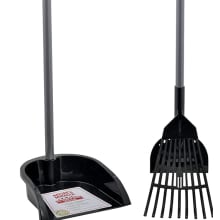
Picking up after your dog doesn't have to involve bending over if you have a rake and shovel set.
For many, a hands-free poop bag holder is enough to let the pet owner safely walk and pick up after their dog.
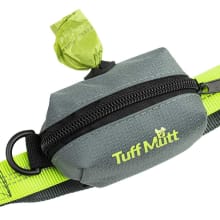
A dog poop bag holder makes it easy to hang onto bags without tying up your hands.
Grooming is another factor that should always be considered when it comes to dogs. Long-haired dogs and dogs with unique coats will always prove the most time consuming and physically demanding to groom. While special brushes such as de-shedders can help, ultimately a Newfoundland is always going to take significantly more work than a chihuahua to groom.
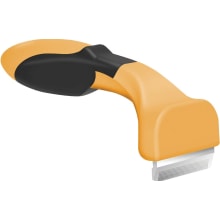
If you must have a dog with long hair, this deshedding tool gets rid of extra hair fast.
A grooming table can help eliminate the awkward angles of trying to groom a dog on the floor, and stairs can be added to help the dog reach the table. However, the person doing the grooming should be able to safely stabilize the dog if it starts to slip off the table to prevent injury to either party.
If time and budget allows, hiring a groomer may be an option, maybe even one that can travel to the pet owner’s home. In this case, regular grooming should be factored into the overall cost of the pet.
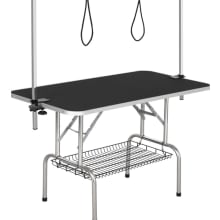
Putting your dog on a grooming table can make routine care much easier for those who can’t stand or bend.
2. Cats
Cats are also a great pet for all ages and ability levels. Unlike dogs, cats never need to be let outside or walked, making them a far less physically demanding pet. They typically provide strong companionship, forming a close bond with their owners. There is also an impressive variety of personalities among felines, from those who love to constantly be by their person to cats content to be aloof roommates who simply coexist.
If scratches or bites are a larger concern, whether because of thin skin, blood thinners, or a high susceptibility to infection, it might be best to adopt a calm adult cat rather than a kitten. Shelters are always full of adult cats in need of homes, and by adopting an adult cat you are more likely to get a sense of their personality and energy level.
Pros
- Low maintenance
- Physical companionship
- Medium lifespan of 12 to 20 years depending on breed
- Easy to adopt from a shelter
Cons
- Litter box may prove a physical challenge
- Allergens from fur and litter box
Cat supplies that simplify routine care
Cats provide most of their own grooming, but indoor cats usually need help with claw trimming. Though long-haired cats need more brushing, many short-haired cats can keep themselves clean of dirt and excess hair without help. If your cat does need an extra brush here or there, some great options, such as deshedding gloves exist to help a person with less fine motor skills easily care for them.
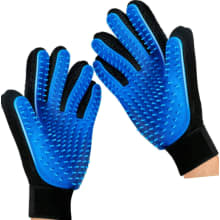
These grooming gloves allow cat owners to remove extra fur despite limited dexterity.
The litter box can often prove a challenge for many because of the weight, the dexterity involved in changing, and associated allergens. If weight is the primary concern, lightweight litter is a great option to consider, as these smaller containers likely weigh less than the cat itself.
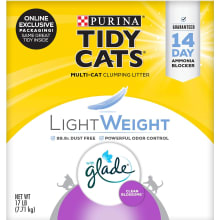
Lightweight cat litter can make maintaining the litter box easier on the back.
For dust concerns, a pellet litter might be better suited for your space. If frequent litter changes might pose a problem, self-cleaning litter boxes can be a tremendous help. If a caregiver or loved one will be present enough to set up the litter box initially and occasionally dump the full litter, keeping the box clean on a daily basis can become significantly more manageable.
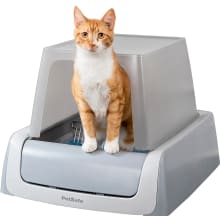
Why struggle with cleaning the litter box when you can have a robot do it instead?
3. Rodents
If your ideal pet can be safely shut away when you aren’t present, a domesticated rodent might be your best bet. While hamsters, gerbils, and mice are common pets, their small size and tendency to bite mean they aren’t the ideal pet for those aging in place. However, rats, rabbits, and guinea pigs offer strong potential as furry friends.
Pros
- Low maintenance
- Physical companionship
Cons
- Short lifespans (rats: 2-4 years, rabbits: 5-12 years, guinea pigs: 5-7 years)
- Night activity can wake up those in the same room
- Not ideal for those with challenges around fine motor skills, involuntary movements, or memory
- Cage cleaning may be a physical challenge
- Allergens from fur, cage bedding, and waste
Rabbit, hamster, and rat supplies to keep them healthy and entertained
Pet rats may not be the first choice for most, but they provide a remarkable amount of companionship and bond strongly with their owners. Their high intelligence and amusing antics provide plenty of joy, though their extremely short lifespans are worth noting.
Rabbits come in a variety of sizes and temperaments and can be litter box trained just like cats, making it easier to have them out of their cage without making a mess. Guinea pigs require the least attention to keep them happy and strike a good balance of enjoying company while being content on their own as well.
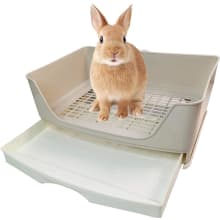
A rabbit litter box can make rabbit care a much cleaner experience.
All three animals provide high engagement and entertainment for their owners, and can be given toys and treats that enrich their lifestyles. The biggest challenge owners of these pets face is keeping the cage clean on a regular basis, as it requires the dexterity to both clean and keep the animal safe while cleaning.

This tunnel is great for keeping rats, rabbits, ferrets, and guinea pigs entertained.
Unlike cats or dogs, these animals are also more reliant on their owner’s memory for filling food and water, as they can’t alert others about these details, so care should be taken to ensure anyone with memory challenges has a backup person checking on the animals on a regular basis.
4. Birds
Domesticated birds can often be found in group settings such as retirement homes and nursing homes because of their active and pleasant nature. Their antics, calls, and sometimes physical interaction allow for easy bonding between bird and human.
Pros
- Medium to long lifespans (budgie parakeets: 7-15 years, canaries: 10-12 years, cockatiels: 15-25 years)
- Low maintenance
- Provides mental stimulation
Cons
- Not ideal for those with challenges around fine motor skills, involuntary movements, or memory
- Cage cleaning may be a physical challenge
- Allergens from feathers and waste
Bird toys and accessories for safety and stimulation
Many are also low effort to care for and content to live their entire lives in well-sized enclosures. If you are looking for a pet that can provide constant visual and auditory engagement but who won’t sit underfoot, birds might be ideal.
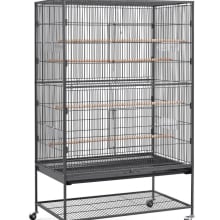
Make sure your bird has a big enough cage. This large, rolling cage is a good size for most domesticated birds.
That being said, researching to find the right bird is vitally important. While some birds are content in captivity, others expect to be frequently out of their cage and provided with ongoing enrichment from their owner. Some birds with quieter voices are well suited for apartments, while others may become a nuisance for your neighbors.
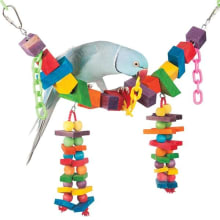
It's very important to make sure your avian friend has toys to keep it engaged and healthy. Hanging blocks and chains designed for birds are often a hit.
It’s especially important to know what you’re getting into before committing, as birds tend to have long lifespans, with some parrots living as long as 70 years. If the bird you adopt is likely to outlive its owner, make sure there’s a backup person planned to take the bird once their owner is gone.
5. Fish
If you are content to watch your pet more than snuggle them, fish might be your ideal companion. Like other tank and cage pets, fish can be provided with fun decorations and environmental elements to add interest for them and their owner. They are more active more often than many pets, and can provide a calming feeling to whatever place they’re in.
Pros
- Low maintenance
- Provides mental stimulation
Cons
- Short lifespans (bettas: 2-5 years, guppies: 2-5 years, molly: 3-5 years, goldfish: 10-15 years)
- Not ideal for those with memory challenges
- Tank setup and cleaning may be challenging
Fish tank accessories to keep fish feeling at ease
While fish are extremely easy to take care of in some respects, they are also require a lot of work in others. Fish are the most likely pets to die unexpectedly from stress, irregular feeding, incorrect tank setup, and disease. Even when properly cared for, most pet fish live for less than five years (with goldfish being an exception).

If you’ve got a fish, this toy can provide hours of enjoyment in the tank.
Even so, because fish do not require handling or playtime to be happy, they can be some of the best pets for those who want passive, low-effort company.
How to choose the best pet for seniors and the disabled
When selecting a pet for someone who is aging or has a disability, here are a few factors to consider.
- Level of companionship: Is the person willing and able to hold the pet?
- Lifespan: Do you want short-term commitment or a long-term friend for someone uncomfortable with death?
- Care and exercise: How much physical ability is required for exercising, cleaning, and grooming the pet? Will someone be around to help with these tasks?
-
Immune system risk: If the owner is immunocompromised, pick pets that carry fewer diseases.
-
Cost: Many people with disabilities or those aging in place live on a tight budget. With that in mind, a cheap pet may be the best option.


